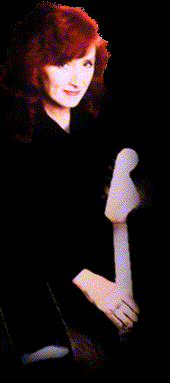 Bonnie Raitt
began her career in the late '60s, singing and playing slide guitar like a Mississippi
bluesman. However, she hardly had the upbringing of one. She was born and raised in
Burbank, California; John Raitt, her father, was a Broadway singer and actor. After
attending high school in Hollywood, Raitt enrolled at Radcliffe College in Massachusetts
but quit school midway through to begin a career as a blues singer. Her ability to play
slide guitar and her blues knowledge impressed the traditional blues artists she often
performed with in Boston folk and blues clubs, and she was welcomed into true blues
circles. Bonnie Raitt
began her career in the late '60s, singing and playing slide guitar like a Mississippi
bluesman. However, she hardly had the upbringing of one. She was born and raised in
Burbank, California; John Raitt, her father, was a Broadway singer and actor. After
attending high school in Hollywood, Raitt enrolled at Radcliffe College in Massachusetts
but quit school midway through to begin a career as a blues singer. Her ability to play
slide guitar and her blues knowledge impressed the traditional blues artists she often
performed with in Boston folk and blues clubs, and she was welcomed into true blues
circles.
Raitt signed a recording contract with Warner Brothers Records and in 1971 released her
highly praised self-titled debut album. She worked with Sippie Wallace, Arthur "Big
Boy" Crudup, and Mississippi Fred Mcdowell, playing folk and blues fests and working
the blues club circuit in the early and mid-'70s. Other albums-Give It Up in 1972, Takin'
My Time in 1973, and Streetlights in 1974 -made her a cult favorite with the blues-rock
crowd, though by this time her albums contained as much or more in the way of pop, rock,
and folk than they did pure blues.
Raitt continued to make albums and tour, though her records sold less and less and her fan
support dwindled. Then in 1989 she signed with Capitol Records. That year she released the
album Nick of Time and pulled off one of the greatest career turnarounds in modern pop
history. Not only did the album become her biggest-selling album ever, but because of it
Raitt won six Grammy Awards. In 1992 her follow-up, Luck of the Draw, won four more.
Though her albums are now stocked with pop songs, she still includes some blues numbers in
live shows and remains an active supporter of the Rhythm & Blues Foundation.  Luck Of The Draw Luck Of The Draw
|

|
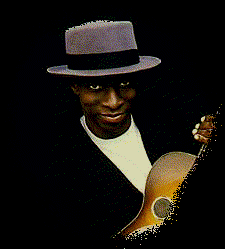 Keb'
Mo' (a.k.a. Kevin Moore) early years was spent with Papa John Creach (Jefferson
Starship and Hot Tuna violinist), when they opened for groups such as John McLaughlin's
Mahavishnu Orchestra and Loggins and Messina. Keb'
Mo' (a.k.a. Kevin Moore) early years was spent with Papa John Creach (Jefferson
Starship and Hot Tuna violinist), when they opened for groups such as John McLaughlin's
Mahavishnu Orchestra and Loggins and Messina. His real springboard into the blues came in 1990 through a
Los Angeles theatre production, Rabbit Foot. They needed an African-American Delta
bluesman, and ironically, he'd just begun exploring the likes of Robert Johnson and Big
Bill Broonzy. The production brought a couple more similar projects, and he now writes his
own material. His self-titled debut album "Keb' Mo'" has 11 original songs, and
two Robert Johnson selections, of whom he is a big fan.
Keb' Mo' was awarded the honor of being the
Country/Acoustic Blues Artist of the Year at the 18th Annual W. C. Handy Awards. He was
also nominated for Contemporary Blues Male Artist of the Year.
 Keb
Mo Keb
Mo
|

|
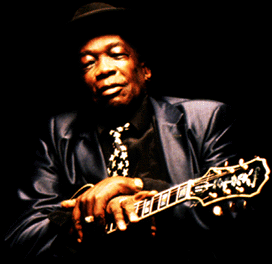 John
Lee Hooker was born in August 1920, in Clarksdale, Mississippi. Travelling a bit
during the 30's, by the 40's he was a factor worker in Detroit. His step father, being a
guitarist, proved a powerful early influence, with John developing a strong taste for
music. Although working in the factory by day, at night he could be found playing in the
clubs and bars. He was spotted by Elmer Barbee, a record store owner. Barbee introduce him
to Bernie Bessman of Sensation Records, and Hooker began to make a name for himself in the
blue's industry. JLH has proved a very enduring musician, and has been acknowledge by many
a star as having influenced there music. John
Lee Hooker was born in August 1920, in Clarksdale, Mississippi. Travelling a bit
during the 30's, by the 40's he was a factor worker in Detroit. His step father, being a
guitarist, proved a powerful early influence, with John developing a strong taste for
music. Although working in the factory by day, at night he could be found playing in the
clubs and bars. He was spotted by Elmer Barbee, a record store owner. Barbee introduce him
to Bernie Bessman of Sensation Records, and Hooker began to make a name for himself in the
blue's industry. JLH has proved a very enduring musician, and has been acknowledge by many
a star as having influenced there music. 1989 brought brought about his best selling album 'The
Healer'. Guest star's on the album included Carlos Santana, Robert Cray, and Bonnie Raitt.
It received Grammy nominations, and swept the board at the 1990's W.C. Handy Blues Awards.
The 90's also saw collaborations with Van
Morrison, with JLH guesting on Van's "Too Long in Exile" album, and with Van
producing and featuring on JLH's 1997 album "Don't Look Back" |

|
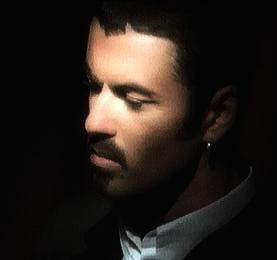 George
Michael - born Georgios Kyriacos Panayiotou on 25th June to a Greek Cypriot
father and an English mother in North London. George's first musical influences came from
his mother's records; the Supremes and Tom Jones. "I was totally obsessed with the
idea of the records; I loved them as things and just being able to listen to music was
incredible." Michael and three friends formed a band called Executive, but it was not
long before Michael, and one of the other members of the band, Andrew Ridgeley, formed
there own band, Wham. From there, Michael went solo, releasing the albums, Faith
and Listen Without Prejudice. An acrimonious dispute with his record company, Sony,
saw almost the end of his career. It ended with Sony selling his contract, and
George Michael releasing the brilliant album 'Older'. George
Michael - born Georgios Kyriacos Panayiotou on 25th June to a Greek Cypriot
father and an English mother in North London. George's first musical influences came from
his mother's records; the Supremes and Tom Jones. "I was totally obsessed with the
idea of the records; I loved them as things and just being able to listen to music was
incredible." Michael and three friends formed a band called Executive, but it was not
long before Michael, and one of the other members of the band, Andrew Ridgeley, formed
there own band, Wham. From there, Michael went solo, releasing the albums, Faith
and Listen Without Prejudice. An acrimonious dispute with his record company, Sony,
saw almost the end of his career. It ended with Sony selling his contract, and
George Michael releasing the brilliant album 'Older'.Over the years, he has won a number of awards, in 1984, he
was awarded the Ivor Novello Award as songwriter of the year at the Brits (UK equivalent
of the Grammys). The same year, he and Andrew won a Band of the Year. As a solo artist,
he's won the Best Male award twice at the Brits ('88 and '97). In America, he won a Grammy
in 1988 for album of the year (Faith). In addition, he and Aretha Franklin won Best
R&B duo for "I Knew You Were Waiting For Me", at the 1988 Grammys. Finally,
he received three American Music Awards in 1989, one of which was Best Male R&B, which
caused a bit of controversy. (He was the first white artist to receive it .) R&B
legend Gladys Knight commented,"It's not as if Bobby Brown had a chance to win in the
Best Male Pop category, because he doesn't get cross the board (air) play like George
Michael."
In response to his critics, George, eloquent
as always, replied,"I didn't ask to receive the award and was overall quite pleased
to get it." |

|
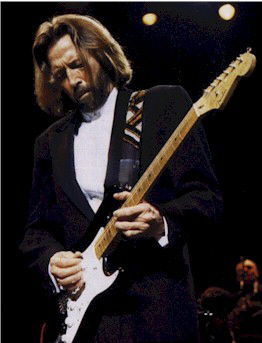 Eric
Clapton had a childhood love of the blues and American R&B. Inspired,
Clapton learnt guitar. After playing in a number of British blues bands in the early
sixties, Clapton became a member of The Yardbirds, whose lineup would eventually include
all three British guitar heroes of the sixties: Clapton, Jimmy Page, and Jeff Beck. He
left in 1966, joined John Mayall's Blues Breakers, and after that formed his own band,
Cream, with Jack Bruce and drummer Ginger Baker. Clapton then joined Traffic's Steve
Winwood to record one album as Blind Faith, rock's first "supergroup," and
became an occasional guest player with Delaney & Bonnie. His lead guitar work on
"While My Guitar Gently Weeps" is a testament to his friendship with the
Beatles' George Harrison, but their closeness led to a difficult love triangle between the
pair and Harrison's wife, Pattie Boyd. Clapton turned his emotional turmoil into a rock
classic. Joined by Allman Brother Duane under the name Derek and The Dominoes, Clapton
poured his heart out on the landmark double album Layla and Other Assorted Love Songs. Eric
Clapton had a childhood love of the blues and American R&B. Inspired,
Clapton learnt guitar. After playing in a number of British blues bands in the early
sixties, Clapton became a member of The Yardbirds, whose lineup would eventually include
all three British guitar heroes of the sixties: Clapton, Jimmy Page, and Jeff Beck. He
left in 1966, joined John Mayall's Blues Breakers, and after that formed his own band,
Cream, with Jack Bruce and drummer Ginger Baker. Clapton then joined Traffic's Steve
Winwood to record one album as Blind Faith, rock's first "supergroup," and
became an occasional guest player with Delaney & Bonnie. His lead guitar work on
"While My Guitar Gently Weeps" is a testament to his friendship with the
Beatles' George Harrison, but their closeness led to a difficult love triangle between the
pair and Harrison's wife, Pattie Boyd. Clapton turned his emotional turmoil into a rock
classic. Joined by Allman Brother Duane under the name Derek and The Dominoes, Clapton
poured his heart out on the landmark double album Layla and Other Assorted Love Songs. Unfortunately, personal struggles
and career pressure on the guitarist led to a major heroin addiction. He withdrew from the
spotlight in the early seventies to conquer his addiction, and rebounded at twenty-nine
with "I Shot the Sheriff," which topped the charts in 1974. Some say he never
regained the musical heights of his heroin days, but, nonetheless, Clapton's legend has
continued to grow. Concerts and albums in the late seventies and eighties were consistent
successes, but Clapton was viewed as a fading star. 1992 was a years of extremes.
Professionally Claptons career was reborn and relaunched by his MTV Unplugged
appearance. But his personal life was shattered with the death of his four year old
son Connor. His Grammy-winning "Tears in Heaven," is a tribute to his son.
In 1994, he began once again to play the blues; his album, From the Cradle, was a return
to raw, traditional songs, and it was a hit with critics and fans alike. His latest album,
Pilgrim, proves that he's just getting better with age.
|
|
|